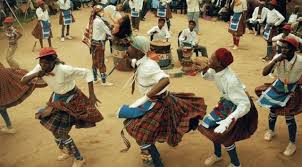Music of South Africa
South African music's unique character arises from its blend of diverse cultural influences and historical contexts. Factors like the fusion of African, European, and Asian music, urbanization, mining culture, the creation of Marabi, and the incorporation of African elements into gospel music all contribute to its distinctiveness. The legacy of apartheid, missionary work, and local music movements like Tzaneen Rap also play significant roles, reflecting the country's social and cultural dynamics.
South African music from the 1980s captures a vibrant cultural scene marked by resistance to social oppression. Bands like Sakhile and Bayete blend Afro-jazz with American fusion and African patterns, showcasing diverse musical influences. The emergence of genres like 'bubblegum' and crossover between black and white musicians, such as Johnny Clegg and Juluka, challenge apartheid's racial divisions. Satirical Afrikaans songs by James Phillips and Ladysmith Black Mambazo's international collaborations highlight music's role in cultural protest and global awareness.
The distinctive sound of South African music is defined by a vibrant fusion of diverse cultural influences, rhythmic complexity, and soulful melodies. It incorporates intricate polyrhythms from African percussion instruments, melodies inspired by traditional African music, Western harmonies, and elements of jazz, blues, and pop. Vocal expression, ranging from powerful harmonies to soulful crooning, is also central to the South African musical experience.
South African music responds to societal challenges like urbanization and apartheid, with Marabi music serving as both entertainment and resistance. Christianity's influence is evident in hymns adapted into African languages, shaping gospel music. In the mid-20th century, Afrikaner composers navigated apartheid's complexities, incorporating Black African music or embracing nationalist sentiments. Today, artists like Simphiwe Dana and Thandiswa Mazwai blend genres, while kwaito and community rap explore cultural identity and social commentary. South African music reflects its diverse heritage and serves as a platform for social and political expression, resonating globally.
Music of South Africa. Wikipedia, Wikimedia Foundation, 20 Jan. 2024, en.wikipedia.org/wiki/Music_of_South_Africa#:~:text=The%20South%20African%20music%20scene,music%2C%20hip%20hop%20and%20amapiano.
The Development of Music in South Africa Timeline 1600-2004. South African History Online, www.sahistory.org.za/article/development-music-south-africa-timeline-1600-2004.









